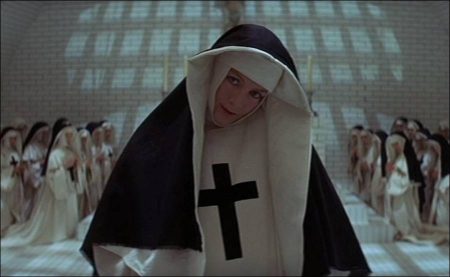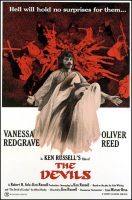Taglines: Hell holds no surprises for them.
The Devils movie storyline. Cardinal Richelieu and his power-hungry entourage seek to take control of seventeenth-century France, but need to destroy Father Grandier – the priest who runs the fortified town that prevents them from exerting total control. So they seek to destroy him by setting him up as a warlock in control of a devil-possessed nunnery, the mother superior of which is sexually obsessed by him. A mad witch-hunter is brought in to gather evidence against the priest, ready for the big trial.
The Devils is a 1971 British historical drama film written and directed by Ken Russell and starring Oliver Reed and Vanessa Redgrave. The film is a dramatised historical account of the rise and fall of Urbain Grandier, a 17th-century Roman Catholic priest accused of witchcraft following the supposed possessions in Loudun, France; it also focuses on Sister Jeanne des Anges, a sexually repressed nun who inadvertently incites the accusations.
A co-production between the United Kingdom and the United States, The Devils was partly adapted from the 1952 non-fiction book The Devils of Loudun by Aldous Huxley, and partly from the 1960 play The Devils by John Whiting, also based on Huxley’s book. United Artists originally pitched the idea to Russell but abandoned the project after reading his finished screenplay, as they felt it was too controversial in nature. Warner Bros. subsequently agreed to produce and distribute the film. The majority of principal photography took place at Pinewood Studios in late 1970.
The film faced harsh reaction from national film rating systems due to its disturbingly violent, sexual, and religious content, and originally received an X rating in both the United Kingdom and the United States. It was banned in several countries, and eventually heavily edited for release in others. The film has never received a release in its original, uncut form in various countries. Critics similarly dismissed the film for its explicit content, though it won the awards for Best Director at the Venice Film Festival, as well as from the U.S. National Board of Review.
Film scholarship on The Devils has largely focused on its themes of sexual repression and abuse of power. It has also been recognized as one of the most controversial films of all time by numerous publications and film critics. The film remained banned in Finland until 2001.
About the Story
In 17th Century France, Cardinal Richelieu (Christopher Logue) is influencing King Louis XIII (Graham Armitage) in an attempt to gain further power. He convinces Louis that the fortifications of cities throughout France should be demolished to prevent Protestants from uprising. Louis agrees, but forbids Richelieu from carrying out demolitions in the town of Loudun, having made a promise to its governor not to damage the town.
Meanwhile in Loudun, the Governor has died, leaving control of the city to Urbain Grandier (Oliver Reed), a dissolute and proud but popular and well-regarded Catholic priest. He is having an affair with a relative of Father Canon Mignon (Murray Melvin), another priest in the town, unaware that the deformed, neurotic Sister Jeanne (Vanessa Redgrave), head of the local convent, is sexually obsessed with him.
She asks for Grandier to become the convent’s new confessor. Grandier secretly marries another woman, Madeline De Brou (Gemma Jones), but news of this reaches Sister Jeanne, driving her to insanity (this includes an attack where Sister Jeanne viciously attacks Madeleine when the latter brings back a book that the former had lent her, and Sister Jeanne accuses Madeleine of being a “fornicator” and “sacrilegious bitch”, among other things).
Baron de Laubardemont (Dudley Sutton) arrives with orders to demolish the city, overriding Grandier’s orders to stop. Grandier summons the town’s soldiers and forces Laubardemont to back down pending the arrival of an order for the demolition from King Louis. Grandier departs Loudun to visit the King. In the meantime, Sister Jeanne is informed by Father Mignon that he is to be her new confessor.
She informs him of Grandier’s marriage and affairs, and also inadvertently accuses Grandier of witchcraft and of possessing her. Mignon relays this information to Laubardemont. In the process, the information is boiled down to just the claim that Grandier has bewitched the convent and has had commerce with the Devil. With Grandier away from Loudon, Laubardemont and Mignon decide to find evidence against him.
Laubardemont summons the lunatic inquisitor Father Pierre Barre (Michael Gothard), a “professional witch-hunter”, whose interrogations actually involve depraved acts of “exorcism”, including the forced administration of enemas to his victims. Sister Jeanne claims that Grandier has bewitched her, and the other nuns do the same. A public exorcism erupts in the town, in which all of the nuns remove their clothes and enter a state of religious frenzy.
Duke Henri de Condé (actually king Louis in disguise) arrives, claiming to be carrying a holy relic which can remove the “devils” possessing the nuns. Father Barre “exorcises” the nuns with it. They appear as though they have been cured until Condé/Louis reveals the case allegedly containing the relic to be empty. Despite this proof that the possessions and the exorcisms are a sham, both continue unabated, eventually descending into a massed orgy in which the nuns sexually assault and desecrate a statue of Christ.
The Devils (1971)
Directed by: Ken Russell
Starring: Vanessa Redgrave, Oliver Reed, Dudley Sutton, Max Adrian, Gemma Jones, Georgina Hale, Graham Armitage, Andrew Faulds, Kenneth Colley, Judith Paris, Murray Melvin, Selina Gilbert
Screenplay by: Ken Russell
Production Design by: Derek Jarman
Cinematography by: David Watkin
Film Editing by: Michael Bradsell
Costume Design by: Shirley Russell
Art Direction by: Robert Cartwright
Music by: Peter Maxwell Davies
MPAA Rating: None.
Distributed by: Warner Bros. Pictures
Release Date: July 16, 1971 (United States)
Views: 220


